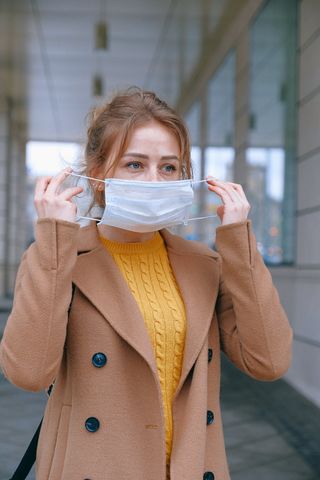Environment
Wear a Mask—For Mom
We are more motivated to change behavior to protect others than ourselves.
Posted May 8, 2020 Reviewed by Devon Frye
Sixteen years ago, my mother spent what would turn out to be her last Mother’s Day in a hospital, recovering from the effects of yet another failed round of chemotherapy. I’ve thought repeatedly about the last few months of her life during this pandemic, and how we were all so focused on protecting her from any errant bug that could literally kill her. Everyone washed their hands before they came into her room. No one with the slightest cold or sniffle could visit. And no one complained or accused us of over-reacting.
We’ve all read about the resistance—at least in some parts of the country and by some politicians—to wearing masks, and the various excuses people give for not complying: “I get tested all the time,” “I’m young and healthy.” But maybe what we need for people to adopt this admittedly new and somewhat awkward behavior is a shift in message. Wearing the mask isn’t about your own health: it’s for your mom.

Research by Adam Grant, a psychologist at The Wharton School, and David Hofmann, the University of North Carolina at Chapel Hill, has shown that health promotion campaigns that focus on pushing doctors and nurses to protect themselves from illness typically fail. Why? Because health professionals—like most of us—often fall prey to an “illusion of invulnerability.” In other words, the belief that “it won’t happen to me.”
So, what does work? Messages that focus on protecting others. In a creative test of the effectiveness of different messages designed to increase handwashing, Grant and Hofmann created two signs that they posted over dispensers for soap and hand sanitizer in a hospital. One said, “Hand hygiene prevents you from catching diseases.” The other said, “Hand hygiene prevents patients from catching diseases.” They then measured rates of handwashing in two ways: how much soap and gel was used (based on how quickly the dispensers needed to be refilled) and how often health professionals washed their hands (based on reporting from trained observers who spied on their colleagues).

Can you predict their findings? A one-word shift in the message—from “Hand hygiene prevents you from catching diseases” to “Hand hygiene prevents patients from catching diseases”—led to significant changes. The sign focused on protecting patients increased the rate of handwashing by 10 percent, and led to a 33 percent increase in the amount of soap and gel used.
Now imagine if we shifted the word "patients" to "mothers." Although they didn’t run this version of their study, it seems likely to make an even stronger impact.
This finding that one word can lead to significant changes in behavior may seem surprising. But it’s exactly what other research by social psychologists reveals about how subtle shifts in framing can make a big difference. In one study, researchers compared different types of messages given to hotel guests to encourage reusing their towels. Some guests received the standard pro-environmental message: “Help Save the Environment: You can show your respect for nature and help save the environment by reusing your towels during your stay.” Others received a similar message, but with a twist: “Join Your Fellow Guests In Helping To Save the Environment: Almost 75 percent of guests who are asked to participate in our new resource savings program do help by using their towels more than once. You can join your fellow guests to help save the environment by reusing your towels during your stay.”

Guess which one was more effective? The second, by far: if we think that most other people are engaging in a certain behavior, then many more of us will decide that we should be too. Research on messages that inspire voting shows precisely the same point: informing people about (high) rates of voting in their neighborhood is far more effective at increasing voter turnout than simply telling people that voting is a civic duty.
So, here’s my proposal for Mother’s Day 2020: Let’s shift the message about wearing masks from one motivated by self-protection to one motivated by concern for all the moms. Wear a mask—for mom.


